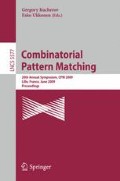Abstract
The haplotype inference problem (HIP) asks to find a set of haplotypes which resolve a given set of genotypes. This problem is of enormous importance in many practical fields, such as the investigation of diseases, or other types of genetic mutations. In order to find the haplotypes that are as close as possible to the real set of haplotypes that comprise the genotypes, two models have been suggested which by now have become widely accepted: The perfect phylogeny model and the pure parsimony model. All known algorithms up till now for the above problem may find haplotypes that are not necessarily plausible, i.e. very rare haplotypes or haplotypes that were never observed in the population. In order to overcome this disadvantage we study in this paper, for the first time, a new constrained version of HIP under the above mentioned models. In this new version, a pool of plausible haplotypes \(\widetilde{H}\) is given together with the set of genotypes G, and the goal is to find a subset \(H \subseteq \widetilde{H}\) that resolves G. For the constrained perfect phylogeny haplotyping (CPPH) problem we provide initial insights and polynomial-time algorithms for some restricted cases that help understanding the complexity of that problem. We also prove that the constrained parsimony haplotyping (CPH) problem is fixed parameter tractable by providing a parameterized algorithm that applies an interesting dynamic programming technique for solving the problem.
Access this chapter
Tax calculation will be finalised at checkout
Purchases are for personal use only
Preview
Unable to display preview. Download preview PDF.
References
The international hapmap project. Nature 426, 789–796 (2003)
Bafna, V., Gusfield, D., Lancia, G., Yooseph, S.: Haplotyping as perfect phylogeny: A direct approach. Journal of Computational Biology 10, 323–340 (2003)
Barzuza, T., Beckmann, J.S., Shamir, R., Pe’er, I.: Computational problems in perfect phylogeny haplotyping: Xor-genotypes and tag sNP’s. In: Sahinalp, S.C., Muthukrishnan, S.M., Dogrusoz, U. (eds.) CPM 2004. LNCS, vol. 3109, pp. 14–31. Springer, Heidelberg (2004)
Brown, D., Harrower, I.M.: A new integer programming formulation for the pure parsimony problem in haplotype analysis. In: Jonassen, I., Kim, J. (eds.) WABI 2004. LNCS (LNBI), vol. 3240, pp. 254–265. Springer, Heidelberg (2004)
Damaschke, P.: Fast perfect phylogeny haplotype inference. In: Lingas, A., Nilsson, B.J. (eds.) FCT 2003. LNCS, vol. 2751, pp. 183–194. Springer, Heidelberg (2003)
Ding, Z., Filkov, V., Gusfield, D.: A linear-time algorithm for the perfect phylogeny haplotyping (pph) problem. Journal of Computational Biology 13, 522–553 (2006)
Downey, R., Fellows, M.: Parameterized Complexity. Springer, Heidelberg (1999)
Eskin, E., Halperin, E., Karp, R.: Efficient reconstruction of haplotype structure via perfect phylogeny. Journal of Bioinformatics and Computational Biology 1, 1–20 (2003)
Gramm, J., Nierhoff, T., Sharan, R., Tantau, T.: On the complexity of haplotyping via perfect phylogeny. In: Proceedings of RECOMB Satellite Workshop on Computational Methods for SNPs and Haplotypes (2004)
Gramm, J., Nierhoff, T., Sharan, R., Tantau, T.: Haplotyping with missing data via perfect path phylogenies. Discrete Applied Mathematics 155, 788–805 (2007)
Greenspan, G.: Geiger D. Model-based inference of haplotype block variation. In: Research in Computational Molecular Biology (RECOMB 2003), pp. 131–137 (2003)
Gusfield, D.: Haplotyping as perfect phylogeny: Conceptual framework and efficient solutions (extended abstract). In: Proceedings of RECOMB, pp. 166–175 (2002)
Gusfield, D.: Haplotype inference by pure parsimony. In: Baeza-Yates, R., Chávez, E., Crochemore, M. (eds.) CPM 2003. LNCS, vol. 2676, pp. 144–155. Springer, Heidelberg (2003)
Gusfield, D., Orzack, S.H.: Haplotype inference. In: Aluru, S. (ed.) CRC Handbook on Bioinformatics (2005)
Gusfield, D., Song, Y., Wu, Y.: Algorithms for Imperfect Phylogeny Haplotyping (IPPH) with a Single Homoplasy or Recombination Event. In: Casadio, R., Myers, G. (eds.) WABI 2005. LNCS (LNBI), vol. 3692, pp. 152–164. Springer, Heidelberg (2005)
Halldorsson, B., Bafna, V., Edwards, N., Lipert, R., Yooseph, S., Istrail, S.: A survey of computational methods for determining haplotypes. In: Proceedings of RECOMB Satellite on Computational Methods for SNPs and Haplotype Inference, pp. 26–47 (2003)
Halperin, E., Eskin, E.: Haplotype reconstruction from genotype data using imperfect phylogeny. Bioinformatics 20, 1842–1849 (2004)
Halperin, E., Karp, R.M.: Perfect phylogeny and haplotype assignment. In: Proceedings of RECOMB, pp. 10–19 (2004)
Hudson, R.: Gene genealogies and the coalescent process. Oxsford Survey of Evolutionary Biology 7, 1–44 (1990)
van Iersel, L., Keijsper, J., Kelk, S., Stougie, L.: Beaches of islands of tractability: Algorithms for parsimony and minimum perfect phylogeny haplotyping problems. In: Bücher, P., Moret, B.M.E. (eds.) WABI 2006. LNCS (LNBI), vol. 4175, pp. 80–91. Springer, Heidelberg (2006)
Kimmel, G., Shamir, R.: The incomplete perfect phylogeny haplotype problem. Journal of Bioinformatics and Comutational Biology 3, 359–384 (2005)
Lancia, G., Pinotti, C., Rizzi, R.: Haplotyping population by pure parsimony: Complexity, exact and approximation algorithms. INFORMS Journal on Computing, special issue on Comutational Biology 16, 348–359 (2004)
Lancia, G., Rizzi, R.: A polynomial case of the parsimony haplotyping problem. Operations Research Letters 34, 289–295 (2006)
Rastas, P., Koivisto, M., Mannila, H., Ukkonen, E.: A hidden markov technique for haplotype reconstruction. In: Casadio, R., Myers, G. (eds.) WABI 2005. LNCS (LNBI), vol. 3692, pp. 140–151. Springer, Heidelberg (2005)
Satya, R.V., Mukherjee, A.: An optimal algorithm for perfect phylogeny haplotyping. Journal of Computational Biology 13(4), 897–928 (2006)
Sharan, R., Halldorsson, B., Istrail, S.: Islands of tractability for parsimony haplotyping. IEEE/ACM Transactions on Computational Biology and Bioinformatics 3, 303–311 (2006)
Tavare, S.: Calibrating the clock: Using stochastic process to measure the rate of evolution. In: Lander, E., Waterman, M. (eds.) Calculating the Secrets of Life (1995)
Wang, L., Xu, L.: Haplotype inference by maximum parsimony. Bioinformatics 19, 1773–1780 (2003)
Author information
Authors and Affiliations
Editor information
Editors and Affiliations
Rights and permissions
Copyright information
© 2009 Springer-Verlag Berlin Heidelberg
About this paper
Cite this paper
Fellows, M.R., Hartman, T., Hermelin, D., Landau, G.M., Rosamond, F., Rozenberg, L. (2009). Haplotype Inference Constrained by Plausible Haplotype Data. In: Kucherov, G., Ukkonen, E. (eds) Combinatorial Pattern Matching. CPM 2009. Lecture Notes in Computer Science, vol 5577. Springer, Berlin, Heidelberg. https://doi.org/10.1007/978-3-642-02441-2_30
Download citation
DOI: https://doi.org/10.1007/978-3-642-02441-2_30
Publisher Name: Springer, Berlin, Heidelberg
Print ISBN: 978-3-642-02440-5
Online ISBN: 978-3-642-02441-2
eBook Packages: Computer ScienceComputer Science (R0)

